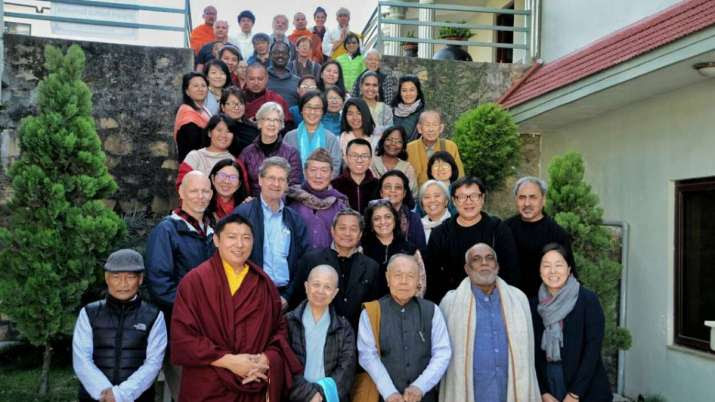
The International Network of Engaged Buddhists (INEB) is an organization that connects engaged Buddhists from around the world with the aim of addressing with environmental concerns, human rights, and conflict resolution. It was established in February 1989 by Sulak Sivaraksa and has members in about 20 countries around the world, mostly in Asia, but also in the USA, Australia and Europe. Its members include monks, nuns, activists, academics and social workers. While it is a Buddhist organization some of its members come from other spiritual traditions and interfaith activities are part of its program. INEB holds an international conference of its members once every two years.
The International Network of Engaged Buddhists (INEB) on Monday published a public statement addressing the global coronavirus crisis, urging all people, nations, and governments, regardless of religious or cultural background or political affiliation, to recognize the interconnected and interdependent nature of our shared humanity as the basis for a united global response to the crisis that has endangered untold millions of people in vulnerable communities around the world.
The statement emphasized the urgent need to express and manifest compassion through increased social solidarity to address the greatest global health crisis in living memory. “Although our daily lives are filled with uncertainty, we can show compassion, friendship, generosity, and kindness by reaching out to others and by reaching across the many social, cultural, ethnic, and religious divides that can no longer be allowed to separate us from our shared humanity,” the statement said. (INEB)

At the time of writing on 20 April, global confirmed SARS-CoV-2 coronavirus infections were reported to have exceeded 2.4 million, with 165,257 deaths so far recorded and 625,001 recovered.* The World Health Organization in March estimated the mortality rate from the virus at 3.4 per cent, based on incomplete and preliminary data, with the elderly and people with underlying health conditions considered most at risk.
In its urgen statemnt, INEB called for a show of global social solidarity founded in peace and social harmony to confront the common threat posed by COVID-19 to save lives, minimize social disruption, and extinguish acts of discrimination by ensuring equal access to essential resources and healthcare:
The virus does not discriminate, but people do, and as a consequence, people are affected differently depending on their economic status, race, caste, religion, gender, and citizenship or place of birth. All of us realize how the lockdown around the world has brought the global economy to a standstill, and has put the lives of millions of the world’s poor and marginalized at great risk. . . .
INEB also appeals to all governments to end any discriminatory practices and segregation of communities and to support each community as an essential part of our shared humanity. INEB appeals to relief agencies to equitably distribute relief aid and not discriminate based on race, caste, religion, citizenship or place of birth, and gender. Additionally, INEB makes a universal appeal to maintain communal harmony and offer loving kindness to all human beings everywhere.
INEB is responding specifically by:
• Calling for an end to policies that inflict suffering on vulnerable and marginalized groups and encouraging action to provide immediate and long-term support to these groups
• Forming an emergency response fund as a resource to help the most vulnerable groups in affected countries in INEB’s network
• Developing a long-term plan for the sustainability of a more just and compassionate post COVID19 world (INEB)
 INEB members at the AC/EC meeting in Nepal in 2018. From ineb.org
INEB members at the AC/EC meeting in Nepal in 2018. From ineb.orgINEB was established in Thailand in 1989 by the prominent Thai academic, activist, and social critic Sulak Sivaraksa and a group of Buddhist and non-Buddhist thinkers and social activists. It was formed with the aim of connecting engaged Buddhists around the world to promote understanding, cooperation, and networking among inter-Buddhist and inter-religious groups, and to address global issues such as human rights, conflict resolution, and environmental concerns.
Conceived as an autonomous organization under the Bangkok-based Sathirakoses-Nagapradeepa Foundation, INEB’s members include monks, nuns, activists, academics, and social workers from more than 25 countries in Asia, Australasia, Europe, and North America, working together under the umbrella of kalyaṇa-mittata.** While a Buddhist organization, INEB welcomes members from other spiritual traditions and recognizes the importance of interfaith activities, stating: “INEB’s philosophy and practice is based on compassion, social justice, non-violence, and co-existence as put forth by Gautama the Buddha. The network’s core mission is to confront and end suffering using analysis and action guided by the Four Noble Truths.” (INEB)
INEB and its network organizations are devoted to four core areas of engagement: 1) Transformative Learning; 2) Cultural Inclusivity & Diversity; 3) Social Justice; 4) Ecology & Economy. Focused initiatives in these areas work to reweave the fabric of local, regional, and international community. The great challenge of our time is to be able to re-birth our world out of the decaying industrial capitalism paradigm. INEB is building the new societies needed for a sustainable post-industrial world.












